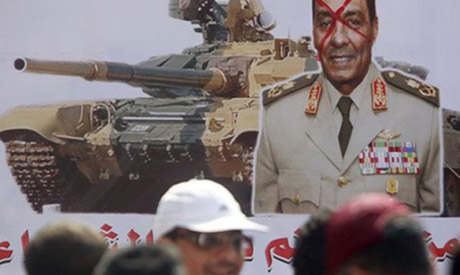
The banner reads 'Unite before the military tanks step on you' (Photo: Reuters)
Prominent political figures, growing increasingly frustrated with the ongoing political turmoil, called on Egypt’s Supreme Council of Armed Forces (SCAF) to swiftly hand over power to a civil authority.
They put forward several suggestions to urge the SCAF to bow to the demands of protesters and leave office as soon as possible following the fresh violence near the parliament building in Qasr Al-Eini Street, downtown Cairo.
An army clampdown on protesters who had staged a sit-in in front of the cabinet premises left at least 12 dead and hundreds injured, sparking a new wave of anger over the military junta's management of the transitional period.
The military council vowed last month to hand over power to an elected president by the first of July 2012 following similar clashes in the nearby Mohamed Mahmoud Street, which left more than 40 dead and scores wounded.
However, amid the conflict in Qasr El-Aini last week, several political figures, journalists and activists called on the SCAF to rapidly step down to avoid further escalation of the ongoing turmoil.
One proposed scenario should see the Shura Council (upper legislative house) election, which is due to take place right after the end of the protracted People Assembly’s elections, cancelled to pave the way for presidential elections on 25 January.
According to that roadmap, the new president would be sworn in on 11 February, the same date autocratic Hosni Mubarak stepped down following January’s popular 18-day revolution.
The April 6 Movement, newly-elected members of parliament Amr Hamzawy and Mostafa El-Naggar, Freedom and Justice Party member Mohamed El-Beltagy and former prime minister Essam Sharaf supported this scenario and called on other political forces to follow suit.
The suggestion was also welcomed by popular Facebook page “Kolena Khaled Said” and gathered momentum on Twitter with its #Egyptpress25Jan hashtag.
However, some experts are concerned such a plan would not give candidates sufficient time to campaign for the anticipated presidential elections while others argue that the constitution should be drafted before a president takes over, to limit the excessive presidential power Mubarak used to have.
Prominent journalist Ibrahim Eissa, editor-in-chief of Tahrir Daily newspaper, had another suggestion.
“SCAF can hand over power to the new speaker of the elected people’s assembly,” he wrote in his daily column on Monday.
“That interim president would have the following powers: Ruling the country for six months, appointing a new cabinet and approving new laws, supervising the drafting of a new constitution and supervising the upcoming presidential elections in June 2012.”
This scenario requires an amendment to the current constitutional declaration but it is likely to face stiff opposition from liberals, who are worried over the prospect that the new speaker of parliament could be chosen by the Muslim Brotherhood’s Freedom and Justice Party (FJP).
The FJP has swept the first two rounds of the lower house elections and is expected to secure the majority of the seats come the end of the process on 11 January.
A third scenario re-emerged after it was turned down by the SCAF on several occasions, which if implemented would see the military junta appoint an interim presidential council comprising of civilians.
Potential presidential candidate Hamdeen Sabhi supported this scenario and, on Tuesday, suggested that the presidential council would include civilians from reformist judges and military commanders from the army to share the rule in this transitional period.
But the old disagreement over the mechanism of choosing the presidential council members still hampers that possibility as well the existance of military commanders of the army worry many that the army would still interfere in the political decision making in Egypt.
However, the powerful FJP said in a statement on Wednesday it opposed all plans to change the roadmap which SCAF announced last month.
“Such changes will not resolve the current conflict, the case is all about who is inciting disorder,” the Muslim Brotherhood’s political arm said.
Short link: